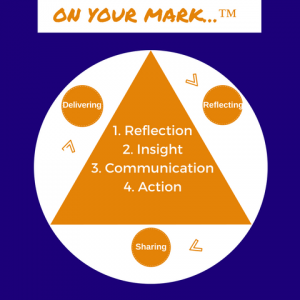Are you happy to hear it’s Go-Time? If you have been following along my last few posts and related episodes you’ll know we are at the fourth stage of the fluid OYM model (see below).
It doesn’t have to take a lot of time to move through all stages AND you may find there are areas of your work where you move more quickly and others where you linger in reflection or communication longer. As long as you move through each of them, not under or around them, there is no ideal time frame. In time, you will instinctively know whether you moved too quickly and then you will reflect on the lesson learned.
Review of Stages 1-3
In What’s Lurking in Your Shadow? I examined the importance of resisting the urge to act quickly – one of the most difficult things for a successful, action-oriented, results-focused leader to do. Even more so when just starting in a new role or after the big promotion. Everything within you, including your dreaded amygdala, is screaming for you to prove yourself and you are sure every “weird” look or innocent “good morning boss” is whispering ‘what are you going to do to make things better and are you even capable’. Along with the article I explore this stage in Episode 095 – What Lesson’s Hiding in Your Shadow.
Two weeks ago in Seeing Around Corners Clearly?, I reviewed the importance of allowing insights to develop, sharpen and reveal themselves in all their wondrous colour and clarity. (Strangely it is at this stage, by being curious, you may find behaviors and outcomes are impacted unintentionally, so pay attention!) This was accompanied by Episode 096 – Seeing Around Corners.
Last week we inched closer to action by gathering all the insights and input together to develop a plan – an execution and a communication plan. In Ready for Go-Time? we explored why it is so important to tailor this to your style, your team, your situation and your desired outcome. The ImpactBank: the Kickass Koach episode – 097 outlines a few of the elements in the process while emphasizing that curiosity still must be front and centre in your approach. Funny enough Ron Friedman sent me an article he wrote for HBR back in 2014, How to Spend the First 10 Minutes of your Day, just as I was writing this first draft – check out the Meez approach!
Time for Action
Today we are stepping off the curb.
You are now in traffic so it’s not the time to get stuck in tunnel vision – listen to Episode 098.
I used to love watching Formula One racing, especially in the days when Jacques Villeneuve was racing. Just like a leader, the racer wants to secure a solid pole position to get a decent start in any race; success in the race begins in the planning/strategy/qualifying stages. With a well considered plan, the driver/leader has set themselves up for success and are prepared to reassess, adjust and pivot as race conditions are revealed.
In this fourth stage you benefit from the preparation you’ve done AND you need to be alert and constantly reassessing your position and the conditions of the marketplace, your internal culture and the impact every one of your actions is having. Many leaders use a SWOT analysis to check in but each situation may be different so you can identify what elements are most important to you for hourly, daily, weekly and monthly observation and analysis. In Rhoda’s case she initially decided to focus on growth in the sales funnel (# of new contacts and engagements with potential clients), quality of service to current clients (where she chose three measures to track including client complaints and process adherence), to name 2 of the 5 she monitored closely. Once she built her short term system of checks and balances, she established conversations with her team to identify 2 long term areas of interest to ensure they weren’t missing future opportunities; within 6 months of conversations two key innovations surfaced and after some experimentation she identified one for focus that materialized and paid significant rewards within 18 months.
Three Considerations
Now that you are ready to move into action it certainly doesn’t mean you won’t be reflecting and sharing daily, more or less. In fact, now is exactly the time you need to do more of it. Think about the F1 driver – if it starts to rain, or stops raining, he may want to change tires or if there have been a few crashes he may need to be prepared to adjust how he enters a particular curve or responds to a flag AND if the pit crew runs into difficulty, how will he adjust to make up time and improve his position?
A few things to consider:
- Throughout your preparatory work in the first three stages, you may have developed a dashboard to measure and observe the impact of the actions you take, as I outlined above. You’ve socialized your plan in various ways through the first three stages so you have a solid idea of where to look and how to assess what you are seeing. As you establish your dashboard, consider what points of reference may reveal new elements of leverage. In episode 098 – I talk about some of the lessons from studying System’s Thinking (Senge’s work in the 1990’s – if you haven’t listened to episode 098, this may be the reason to listen).
- Keep your people close. It relates to my first point – your people are your best resources for watching and noticing. Remember you keep moving through the three elements of reflecting, sharing acting throughout. Listen to people far more than you instruct them or direct them. It may feel counter-intuitive, after all, you are the boss! You can’t learn anything if you are the one talking. Before you make a wise decision you need all the information available.
- Seek Perspective. This moves beyond listening to what your people say – look at what they do AND one step further, try to get into their shoes – this increases your ability to see more broadly and it expands your influence. In Episode 098 I mention a key note with Daniel Pink where he mentions research that indicates the more a person has power and position, the harder it is for them to access empathy. I promised to try to find a link – and while I am not certain what specifically Pink was referencing, here is an article that references some cool research on the subject. (I just love that the article references research done at the Grad School I attended – WLU) I plan to do a whole episode on this in the future – fascinating.
No matter how brilliant a leader you are IT IS ESSENTIAL that you be ready to adapt. That’s from episode 92 – the ability to adapt and change is a key to making Go Time work. Rhoda was ready but this is when the cycle of reflecting , sharing, acting becomes a daily, sometimes hourly cycle. You learn something and you reflect on it, you explore with the person or a trusted confident before you act on it. You need to be willing to adapt but if you skip to action because you see one data point, you will be spinning – listen to episode 098 for an example from Rhoda’s experience.
In episode 92 I outlined three of the elements of Rhoda’s Plan and I promised to outline them again here:
- Quarterly Meetings with the entire team where she could listen to there challenges, victories and suggestions in a forum full of shared learning and open facilitated dialogue to unlock shared values and opportunities for innovation.
- Team Engagement. She developed a Leadership Team approach that ensured she had trusted confidantes in each of the key areas of the business who learned to appreciate each other and the value of seeing their functions in relationship to each other.
- She hired an external consultant with significant subject matter/industry experience to evaluate some of her key observations and the innovations that surfaced. She discovered quickly that this consultant could also deliver significant learning experiences for her entire team during a few of the Quarterly Meetings.
Most important for you to remember: your success is all about the people. You are responsible for setting the tone and nurturing the climate and culture. What you then do with it, will determine the success you create around you.
Next time: In February I did a series on networking during which I posited that your deep need to belong drives almost every thing you do so we are going to explore how to turn your Shadow into Motivation.


